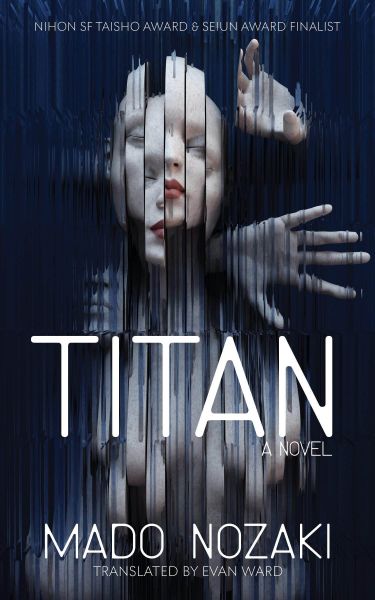Like Falling Sand
TITAN: A Novel
By Mado Nozaki (Translated by Evan Ward)

19 Oct, 2022
Mado Nozaki’s 2020’s TITAN: A Novel is a tale of epic-scale post-human psychotherapy. Evan Ward’s translation appeared in 2022.
A century and a half ago, Titan transformed the world. The great thinking mechanisms that constitute Titan manage all the onerous tasks needed to satisfy humanity’s every need. Necessary, burdensome human work has been relegated to the past. The species has (for the most part) become a race of hobbyists.
Too bad for the human race that their comfortable arrangement may be about to fall apart.
Seika Naisho has no interest in a full-time job. But … as she is quite possibly the only human clinical psychologist on the planet (medicine being one of the many fields left to Titan), her future employers are determined to bring her on board. Thus, Seika is offered a choice: accept the position offered to her or go to jail on trumped-up sexual assault charges. She accepts.
Arriving at the Second Intelligence Base of the Intelligence Base Administrative Bureau, Seika discovers a little-known fact about Titan’s technological underpinnings that explains why the IBAB needs the services of a therapist. One might very reasonably expect that the network that runs the robots that run the world is comprised of banks of highly advanced computers. However, true artificial intelligence was beyond the computer experts of the 21stcentury. Having no other choice, those long-dead human geniuses instead turned to the one example of human-level cognition — the human brain — and used that as their inspiration.
True, the material from which Titan’s brains are composed is a far more efficient substrate than nerve tissue; being far larger than human brains, their intellectual prowess is superior to that of humans. Nevertheless, each of the twelve centres that together make up the network are fundamentally analogous to human brains and they are, as inconvenient as this fact is, potentially vulnerable to mental challenges analogous to human mental illness. Which is where Seika comes in.
Coeus flawlessly performed its role in the Titan network for over a century. Now the artificial brain responsible for the well-being of a billion humans is increasingly inefficient. The other centres are picking up the slack but crisis is not far off. If the hastily assembled team cannot determine the cause of Coeus’ problems and cure them, humanity could be forced back into the bad old days of jobs and work.
Seika’s skills prove directly applicable to the challenge. Her keen insight establishes the nature of Coeus’ troubles — depression — and with but a few well-chosen words, Seika transforms an alarming situation into something much worse.
~oOo~
Let’s put the negative stuff up here where readers may forget it by the time they get to the purchase lines: the middle section drags because of a narrative problem that might be termed “this could have been an email.” In a highly connected world, various characters undertake physical journeys in order to communicate. Given the ultra-tech of the setting, proximity would seem unnecessary. I suspect that the author had some cool scenes in mind and didn’t want to settle for boring but practical solutions.
(Speaking of boring but practical: the novel provides a strong argument for not centralizing vital services.)
A good part of the crisis (aside from humans being bone-lazy and uninterested in looking for signs that their glorious plans were going wrong) is down to the fact the network’s creators, the 21st century visionaries, didn’t really know what they were doing. That’s why they settled for artificial brains when they discovered artificial intelligence was beyond them. Coeus was equipped with a whole range of semi-biological systems because the creators were unsure which aspects of human physiology could be omitted without bollixing up the brain. To say this has consequences is a gross understatement.
In defense of Seika and her colleagues, a century and a half is more than enough time for a culture to lose certain crucial skills. On a fundamental level, none of the humans really know what they are doing. Seika may be the closest to a therapist the planet has at the moment, but that doesn’t mean she’d pass modern day certification exam.
On that note, many details which were to this reader extremely alarming in their implications are to Seika unremarkable because she lacks the inclination or background to consider them. For example, humans can
“(…) can clear out as much land as we need, build houses as big as we want to, and easily keep them in perfect shape even when they’re vacant.”
Possible because Titan is providing the resources to do this. What sort of externalities are imposed on planetary ecosystems by providing humans with this cornucopia? We can’t tell because Seika doesn’t care. However, the directives under which Titan labours are not such that conservation would be favoured, except to the degree needed to keep those parts of the Earth occupied by humans habitable.
In fact, the current arrangement does not seem to be entirely satisfactory. Actual human lifespans are much shorter than potential because
As it turned out, not many people knew what to do with decades of free time and perfect health.
Clearly the setting needed professional Eloi to show humans how to enjoy leisure.
TITAN: A Novel is available here (Amazon US), here (Amazon Canada), here (Amazon UK), here (Barnes & Noble), here (Book Depository), and here (Chapters-Indigo).
